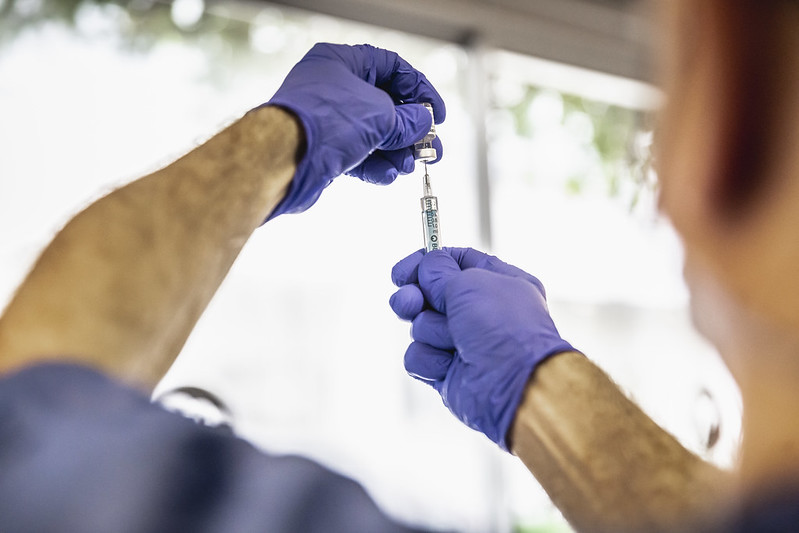
A nurse prepares an ARNm vaccine against COVID-19. Picture: Ariadna Creus and Àngel García, Banc d’Imatges Infermeres.
A study led by the Global Vaccine Data Network (GVDN), with the participation of IDIAPJGol, has analysed health records from more than 230 million people across twenty countries to determine the link between COVID-19 vaccines and the risk of developing Guillain-Barré syndrome. This rare autoimmune disorder had previously been associated with this new generation of vaccines. IDIAPJGol contributed data from patients in Catalonia, recorded in the Information System for the Development of Research in Primary Care (SIDIAP), via the VAC4EU network.
Guillain-Barré syndrome is a rare neurological disorder in which the body’s immune system attacks the nerves. The disease can be triggered by various infections, such as those caused by the Campylobacter jejuni bacterium or by viruses such as Zika, influenza, or SARS-CoV-2 (the virus responsible for COVID-19). Guillain-Barré syndrome can lead to progressive weakness, numbness, and in some cases, paralysis. Although there is currently no cure for the disease, most people recover fully with symptomatic treatment.
Slight increase with Adenoviral Vector Vaccines
According to the research, recently published in the journal Vaccine, individuals who have had a SARS-CoV-2 infection are three times more likely to develop Guillain-Barré syndrome within six weeks of infection. The analysis revealed a moderate increase in the risk of GBS following the administration of adenoviral vector-based vaccines (those developed by AstraZeneca and Janssen/Johnson & Johnson against COVID-19), although the absolute risk remains exceptionally low.
By contrast, mRNA vaccines (Pfizer-BioNTech, Moderna) and inactivated formulations (CoronaVac/Sinovac) were not associated with an increased risk of developing the disease.
Need for common protocols
The study, which includes data from Africa, Asia, Europe, the Americas, and Australia, highlights variations in the quality of available data and in the criteria used to confirm Guillain-Barré syndrome. Only 75 % of countries had detailed clinical records with electromyographic confirmation. In lower-resource regions, case reporting was more delayed and inconsistent.
The research team recommends implementing standardized protocols for the collection and assessment of cases, improving data flows between primary care centres and hospitals, and establishing multidisciplinary teams to ensure continuous global monitoring of vaccine safety.
IDIAPJGol researchers Felipe Villalobos, Martín Solorzano, and Carlo Alberto Bissacco, who participated in the study, emphasize that “this study reinforces an idea we’ve known for some time: the potential health risks from COVID-19 are greater than those associated with vaccination, which plays a key role in protecting against the severe consequences of infection.”
Study reference
Nasreen S, Jiang Y, Lu H, Lee A, Cutland CL, Gentile A, Giglio N, Macartney K, Deng L, Liu B, Sonneveld N, Bellamy K, Clothier HJ, Sepulveda Kattan G, Naus M, Naveed Z, Janjua NZ, Nguyen L, Hviid A, Poukka E, Perälä J, Leino T, Chandra LA, At Thobari J, Park BJ, Choi NK, Jeong NY, Madhi SA, Villalobos F, Solórzano M, Bissacco CA, Carreras-Martínez JJ, Correcher-Martínez E, Urchueguía-Fornes A, Roy D, Yeomans A, Aurelius T, Morton K, Di Mauro G, Sturkenboom MCJM, Sejvar JJ, Top KA, Batty K, Ghebreab L, Griffin JB, Petousis-Harris H, Buttery J, Black S, Kwong JC. Risk of Guillain-Barré syndrome after COVID-19 vaccination or SARS-CoV-2 infection: A multinational self-controlled case series study. Vaccine. 2025;60:127291. doi:10.1016/j.vaccine.2025.127291